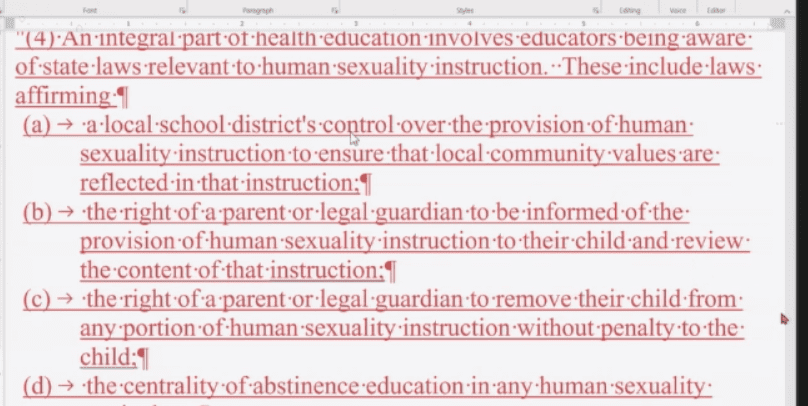While the far left failed another attempt this week to inject their agenda into Texas’ sex education curriculum, two members of the State Board of Education followed the citizens’ cry to put their concerns first. The health curriculum heads for a final vote on Friday.
The full committee of the State Board of Education has been holding public hearings this week and considering amendments of revised public education standards—known as Texas Essential Knowledge and Skills (TEKS)—for science, physical education, and health education.
The health portion of TEKS has been center stage in a conflict between citizens and the far left over what taxpayer-funded schools should be teaching children about sex. Citizens won the previous round in September, preventing highly sexualized “LGBTQ+” and pro-abortion material from being added.
The final round is this week.
On Tuesday, citizens spoke to the board, asking for sex education to remain focused on discussion with parents, abstinence, and not to include the LGBTQ agenda.
“[Parents] are the experts. They know what’s best for the child,” educator Tonya Waite said.
“Abstinence is the optimal health message for all of our children. There is no need to label, no need to target, no need to separate different groups of our children,” said Janice Weaver, a retired educator and executive director of South Texas Pregnancy Center.
“Adding the word ‘consent’ to TEKS would mean putting students closer to sexual activity,” citizen Dan Bailey told the board a day earlier. “I don’t think we should be saying you can have sex.”
On Wednesday, rather than listening to citizens, board members Ruben Cortez Jr. (District 2) and Marisa Perez-Garcia (District 3) tried and failed to steer sex education in the opposite direction.
Cortez proposed amendments for seventh grade through high school, all of them inserting LGBTQ+ language in the TEKS section on bullying.

“I think that it’s important for us to explicitly mention sexual gender or identity,” Perez-Diaz said in support. “I think the language needs to be more explicit, especially in the middle school area.”
The first two amendments failed, and Cortez asked for a roll call vote on the high school amendment. Board members Cortez, Davis, Lawrence Allen, Georgina Perez, and Matt Robinson voted yes.
Board members Donna Bahorich, Barbara Cargill, Patricia Hardy, Pam Little, Tom Maynard, Sue Melton-Malone, Ken Mercer, Marty Rowley, and Chair Keven Ellis all voted no.
Perez-Diaz then offered an amendment for middle school to “analyze the similarities and differences between legal consent to sexual activity and affirmative consent to sexual activity.”
The amendment failed.
Most of Wednesday’s action on sex education was a battle charge led by board members Bahorich and Maynard to accomplish what citizens wanted.
Maynard introduced perhaps the most important amendment, affecting fourth grade to high school, requiring sex education to match state law, including parental rights and the focus on abstinence.

The amendment passed.
For grades seven, eight, and middle school, Bahorich pushed through amendments to warn children about sexually transmitted diseases, as well as an amendment teaching kids how to avoid “behaviors that increase sexual risk.”
For middle school, Bahorich pushed through amendments that promote marriage and abstinence, removed teaching different sex acts that transmit STDs, and clarified how to teach the illegality of adult relationships with minors.
The process isn’t over, as the TEKS are headed to a final vote on Friday. Amendments are due by 5 p.m. on Thursday.
Concerned citizens may contact their member of the State Board of Education.





